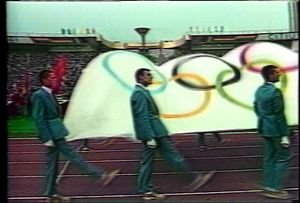Hot Topics
Know the Bias in Your Media
*AllSides is an independent site that BPL does not necessarily support or oppose.
Add your vote!
The Summer Olympics: A Very Short History
“The goal of the Olympic Movement is to contribute to building a peaceful and better world by educating youth through sport practised in accordance with Olympism and its values.”
(Olympic Charter, Chapter 1, Rule 1.1)
The 2024 Summer Olympic Games will be held in Paris from July 26—August 11. The
*The Paralympics, Youth Olympics, and other similar Games are outside the purview of this page.
What are the Summer Olympics?
(Jump to Olympic Games Controversies)
From the official website for the Olympics: "The Olympic Games are the world's only truly global, multi-sport, celebratory athletics competition. With more than 200 countries participating in over 400 events across the Summer and Winter Games, the Olympics are where the world comes to compete, feel inspired, and be together."
The 2024 Summer Olympics include sports and events that are ideally performed outside in warm weather. The Winter Olympics hold events best performed indoors or in cold weather. At the 2024 Paris Summer Olympics, there are 45 different sports.
How Did the Games Begin?
The modern day Summer Olympic Games was first held in Athens in 1896. The games are held every four years in different cities around the world. The Games are organized by the International Olympic Committee, founded by Pierre de Coubertin in 1894. The IOC has a 16-point Mission statement which focuses on the welfare of the Olympic Games and it's athletes.
Who Participates?
Perhaps an even better question is, who doesn't participate? The Olympic Games' history is rife with exclusions of athletes based on gender, race, indigeneity, drug use (as in the 2022 case of Sha'Carri Richardson vs Kamila Valieva), war crimes, and more. Who gets included and who gets excluded in the Olympics is an ever-changing answer. In theory though, any qualifying athlete from any country may participate. At the Olympic Summer Games in Paris in 2024, around 10,500 athletes from 206 National Olympic Committees* will compete.
What are the Current Medal Standings?
The All-Time Medal table below comes from Wikipedia.
| No. | Nation | Gold | Silver | Bronze | Total | Games |
|---|---|---|---|---|---|---|
| 1 | 1065 | 835 | 738 | 2638 | 28 | |
| 2 | 395 | 319 | 296 | 1010 | 9 | |
| 3 | 285 | 319 | 314 | 918 | 29 | |
| 4 | 262 | 199 | 173 | 634 | 11 | |
| 5 | 223 | 251 | 277 | 751 | 29 | |
| 6 | 217 | 188 | 213 | 618 | 28 | |
| 7 | 201 | 207 | 247 | 655 | 17 | |
| 8 | 181 | 154 | 176 | 511 | 27 | |
| 9 | 169 | 150 | 178 | 497 | 23 | |
| 10 | 164 | 173 | 210 | 547 | 27 | |
| 11 | 153 | 129 | 127 | 409 | 5 | |
| 12 | 149 | 126 | 151 | 426 | 6 | |
| 13 | 148 | 176 | 179 | 503 | 28 | |
| 14 | 101 | 85 | 119 | 305 | 26 | |
| 15 | 96 | 91 | 100 | 287 | 18 | |
| 16 | 95 | 105 | 122 | 322 | 27 | |
| 17 | 90 | 97 | 121 | 308 | 22 | |
| 18 | 84 | 69 | 82 | 235 | 21 | |
| 19 | 72 | 89 | 137 | 298 | 22 | |
| 20 | 71 | 109 | 146 | 326 | 27 |
* What is a National Olympic Committee (NOC)? Their role is to ensure the representation of their respective countries at the Olympic Games by sending competitors and officials as well as to promote the fundamental principles and values of Olympism in their countries, in particular in the fields of sport and education.
Summer Olympic Games Controversies
Although far from an exhaustive list, this section will focus on two broad subject areas within the Olympic Games that have proven controversial over the years. Each subject is briefly summarized. For more controversies and scandals, see the resource list at the bottom of the page.
Environmental Impact | Inclusion & Exclusion | Resources to Learn More
Environmental Impact
Do the Olympics negatively or positively impact our environment?
The 2024 Olympics in Paris website has many sections dedicated to the Games' environmental impact. Why? Because, historically speaking, the Olympic Games have been criticized for negatively impacting the environment. Compare these conflicting headlines from notable organizations:
-
The Olympics Are Hard on the Environment, the Council of Foreign Relations, 2021
-
Paris 2024 Olympics: A Greenwashing Nightmare or a Genuine Effort to Save the Planet?, Earthday.org, 2023
-
Environmental benefits of hosting the Olympic Games, Olympics.com, Undated
Based on these few articles, there are clearly conflicting answers to our original question: Do the Olympics negatively or positively impact our environment? Note how the biases of the sources may impact how they answer this question. (See left for a guide on navigating bias).
"An evaluation of the sustainability of the Olympic Games" published by the academic journal Nature Sustainability provides several charts and graphs to help us visualize the environmental (social and economic) impact of the Games. Below is "Fig. 5: Sustainability of individual Olympic Games compared, 1992–2020" (Click the image to see a larger version).
According to the article's author, Martin Müller:
"The Olympic Games claim to be exemplars of sustainability, aiming to inspire sustainable futures around the world. Yet no systematic evaluation of their sustainability exists. We develop and apply a model with nine indicators to evaluate the sustainability of the 16 editions of the Summer and Winter Olympic Games between 1992 and 2020....Our model shows that the overall sustainability...has declined over time....No Olympics, however, score in the top category of our model. Three actions should make Olympic hosting more sustainable: first, greatly reducing the size of the event; second, rotating the Olympics among the same cities; third, enforcing independent sustainability standards."
What do you think? Does the Olympics' impact on the environment contribute to building a peaceful and better world?
Inclusion & Exclusion
What does an athlete have to do to participate in the Olympic Games?
"Athletes must first comply with the Olympic Charter and follow the rules of the International Federation (IF) governing their sport. The IFs establish the rules and organise qualifying events, while the National Olympic Committee (NOC) of the athlete’s country supports the athlete and is responsible for entering them for the Games."
If an athlete qualifies to compete under the rules of IF and NOC, why is there a history of exclusion in the Olympics?
There are numerous reasons (or excuses) for why countries have chosen to exclude their own countrymen, boycott the Olympics altogether, or been banned by the IOC from participating. In November 2021, the IOC released the Framework on Fairness, Inclusion and Non-Discrimination on the Basis of Gender Identity and Sex Variations. The necessity of such a framework points to the Olympic history of exclusion or discrimination. Here is a short, inexhaustive list of instances of exclusion:
- War in Ukraine. Russia and Belarus are barred from team sports at the 2024 Paris Olympics. IOC excludes Russian and Belarusian athletes from taking part in the Paris Olympics opening ceremony, The Associated Press, March 2024.
- Race.
-
Berlin Olympics 1936. Nazi Germany banned "non-Aryans" from participating in German athletic organizations. "Jews or individuals with Jewish parents and Roma (Gypsies)—were systematically excluded from German sports facilities and associations." Holocaust Encyclopedia. August 2023. Accessed June 2024.

- South Africa was banned from the 1964 Tokyo Olympics due to apartheid.
-
- Gender. Women were not allowed to compete in the Olympics until 1900. Of 997 athletes, 22 women competed. At the 2024 Paris Olympics, there are equal numbers of women and male athletes competing for the first time in the history of the games.
- Testosterone Levels. Two Namibian athletes were banned from the Tokyo 2020 games because their natural testosterone levels were considered too high.
- Boycotts. The USA, amongst other nations, famously boycotted the 1980 and 1984 Olympics in protest of the Soviet invasion in Afghanistan. Wikipedia has a list of all Olympic games boycotts.
- Indigeneity. Athletes who identify with Indigenous Nations are unable to participate under their own nation as they don't represent a country with a National Olympics Committee. The Haudenosaunee Nationals are currently fighting to represent themselves in the 2028 Olympic games.

- Nationalism + Olympics
- A 1984 story on Nationalism and sport from WCVB. Video footage includes: Joe Louis, the 1984 American Cup, and an interview with Professor Walter Clemens on how nationalism seeps into the Olympics and how Soviet countries are not very good economically or culturally, but they can compete with the West in sporting events.
"Nationalism + Olympics." Motion picture. WCVB Collection. Digital Commonwealth.
Resources to Learn More
-
Controversy, Scandal, & The Olympic Games
 Get excited for the 2024 Summer Olympics with this list of recommended books, movies, and more! This list focuses on the controversial games and athletes throughout the storied history of the Olympic Games.
Get excited for the 2024 Summer Olympics with this list of recommended books, movies, and more! This list focuses on the controversial games and athletes throughout the storied history of the Olympic Games.
-
Olympic World LibraryOWL is simultaneously a library catalogue, an information portal and a search engine for Olympic knowledge. Via this portal you can access the unique collections of The Olympic Studies Centre, with all the official Olympic publications, and also find books, articles and selected dissertations produced by academics and professionals from all around the world.
-
The Olympic Games and the Environment by John Karamichas
Publication Date: 2013This book examines the environmental credentials of Olympic Host cities and the opportunities afforded by hosting the Games towards the ecological modernization of the host nation by using perspectives offered by environmental sociology. You can read this paper online as well.
-
Paris Olympics 2024 ScheduleCompetition schedule for the summer Olympics by event.
-
National ArchivesSummer Olympics holdings from the National Archives. View photographs, videos, and other materials.
- Last Updated: Jun 24, 2025 7:48 PM
- URL: https://guides.bpl.org/hot-topics
- Print Page


